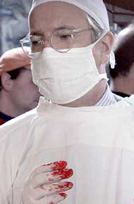
He's Going to Operate...
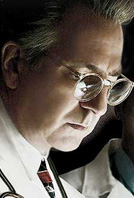
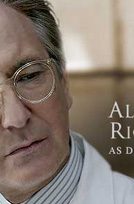
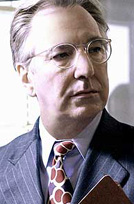
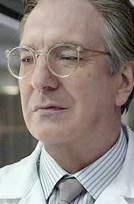
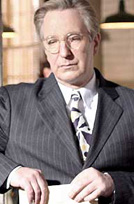
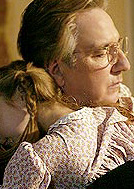

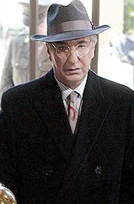
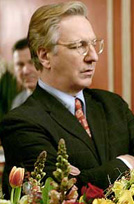
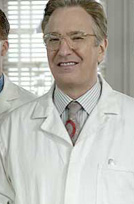
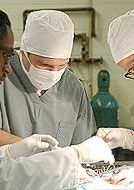
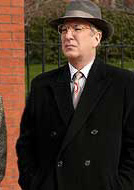

 He's Going to Operate... |













|
Something the Lord Made: Official Site
Interview with Alan Rickman
HBO
When you play a man like Dr. Blalock, do you feel a certain responsibility in bringing his character to life because it's a part of history, and it's a story that most people probably will not know.
ALAN RICKMAN
Well, I certainly knew nothing about this story. And I think we're all forgiven, in a sense, because I was talking to one of the doctors who is currently working at Johns Hopkins, and he says a lot of the staff there even today didn't know.
And in a way I guess that's the point. You know, a black man is still not properly honored, even though he was given an honorary doctorate later on in his life.
But I think it's still fresh news to a lot of people. So it's great to be part of a story that I knew nothing about. You feel very protective of somebody that you play. Because I've done it a couple of times, play somebody who actually lived. I mean, there is the technical aspect of who were they and what did they do and what were the details of their life. But, there is something else that happens, and you just become very protective of them as a person. I don't know, somehow or other they start to inhabit you. Or a spirit does.
HBO
I like the way you say you are a little protective of that person. Could you expound on that a little bit?
ALAN RICKMAN
Well, inevitably, when you reduce a person's life down to an hour and a half, or two hours, there is dramatic license at certain points. And then when you put that together with my own research and my own reading, and talking to people who knew him and, and indeed talking to the director and producers, it's not that those conflict, but you know, different people maybe want different things.
And so this protectiveness of Blalock as a human being, to me, as the kind of arbiter of the choices that are available to you. What kind of person was he? And therefore, how did he react in certain situations?
HBO
From what you've learned of him, what kind of person was he?
ALAN RICKMAN
Like any great professional, I suppose, very, very focused on the job that, I guess, in a way, he was born to do. And in fact, that kind of over-focus on your work perhaps means that your home life gets affected, and your relationship with your wife and children takes a bit of a back seat when a career is involved.
HBO
How would we describe the relationship, between Vivien Thomas and Dr. Blalock?
ALAN RICKMAN
Well, it's a relationship that starts out, if you like, as master and servant, in a way. And then it becomes teacher and pupil. And then they're pretty much joined at the hip on a practical level. You know, the one can't move without the other.
But of course this is 1943, when at any other time, like now, Vivien would be trained to be a doctor, or he would be a qualified doctor. Then it was not possible for him economically, or in any way at the hospital, to become a black doctor. So he remained officially a surgical technician.
But there is no way that Blalock could have accomplished the world's first heart operation without Vivien Thomas standing on a step stool, looking over his right shoulder and saying yes, fine, change this, do that, while Blalock did the operation. Because Vivien had done it so many times before in operations on dogs, which is the way they practiced it.
HBO
Were they friends, or because of the times it just was not a possibility?
ALAN RICKMAN
Well, I think it's more complicated than that. They were so much people of their time. He was landed gentry from Georgia, Blalock. But, he took Vivien everywhere with him, to every new job. It started out in Nashville. And he wouldn't accept a job unless he was able to take Vivien with him. So, in that sense he fought for him.
But he was so much a victim of the time that he thought it was perfectly OK to supplement Vivien's wages by offering him the opportunity to serve drinks at his parties. And he didn't see anything wrong with that. And in a way, neither did Vivien. So, it was more.
I said it was almost like a love affair, but more accurately, it's more like a marriage. Which is, there's a difference. [LAUGHTER]
HBO
Had you had a chance to meet any of the family members on either side?
ALAN RICKMAN
I met Vivien's nephew, yeah. He's a doctor himself.
HBO
What is his feeling about their relationship?
ALAN RICKMAN
We did an interview in Los Angeles recently, and according to him, he said, when my uncle invented this procedure, and I said, excuse me? [LAUGHS] Let's get this right here. [LAUGHTER] It's called the Blalock/Taussig procedure for good reason. It was their concept.
It couldn't have happened without Vivien's skill, because he practiced all the suturing that made it possible. And he made all of the implements that up until that point hadn't been invented.
HBO
You mentioned Dr. Taussig. Talk about how she fits into the story.
ALAN RICKMAN
Well, Helen Taussig was an MD in the hospital. And brilliant at diagnostics. Or diagnosing, anyway, what was wrong with these children. She was the first person who went to Blalock and said, look, there is this problem with blue babies. And nobody has come up with a surgical solution. She was particularly brilliant at diagnosing, because she was actually quite deaf, so the stethoscope wasn't much use to her, so everything was done by touch with her.
So it was a very subtle skill that she had. But it was very much to do with her diagnosing what the problem was and how it was happening. And then Blalock working out a surgical solution to it.
HBO
I love the title. Could you talk a little bit about it?
ALAN RICKMAN
Well, the title refers to, I suppose, a kind of wonderment that Blalock has about the skill that Vivien had in suturing. You know, these stitches that he put in the arteries were so beautiful and small.
Because we're talking about impossibilities here. They're operating in a space this big, and then you're talking about arteries the size of a piece of spaghetti, and somehow they're sewing the inside and the outside with two different stitching techniques to get them to join on to the pulmonary artery. So it's an extraordinary skill. So, he says, this looks like something the lord made.
HBO
In bringing the character of Blalock to life, did you find that you liked him as a person?
ALAN RICKMAN
Well, whenever I play any character I never judge them, so it's important for me not to have those kind of opinions. It's not like I like him or dislike him. I just play him. And it's for other people to make those judgements.
I'm on the inside looking out. It's for you to decide whether you like him or dislike him. But I think he's a complicated person.
He was a brilliant teacher in later life, and he also was responsible for promoting the careers of many of the young doctors that worked with him. So, his eye was always on a kind of wider picture.
HBO
Which I suppose accounts for his working relationship with Vivien.
ALAN RICKMAN
Absolutely, because he was completely color blind in that sense. This was somebody who he worked with. It was only outside pressures and the time that he lived in that made them walk in two different directions at the end of the day.
HBO
Had you met (director) Joseph Sargent before?
ALAN RICKMAN
No, but I knew of him, because a great friend of mine Alfre Woodard had worked with him, famously.
HBO
What do you think of his style? How has he helped you as a director?
ALAN RICKMAN
Well, first of all, you have to keep up with him. I mean, how is he still standing at midnight every day? It's jaw droppingly inspiring. [LAUGHS] And completely focused. In a way, you look at him and you think of Blalock, and you see these two men absolutely focused on what it is they're trying to achieve. So that's a huge part of what you want from a director, that they're absolutely glued to the project.
HBO
What was the appeal of this particular film for you?
ALAN RICKMAN
I always find it appealing to play people who it's not easy to rubber stamp and put a label on their forehead and say who they are. I think you, as a viewer, you have to have a kind of conversation with yourself, and the character, and what you think and feel about them and what they're doing and how they're doing it and how they're going about it, and the time that they lived in.
In other words, I'm a big fan of telling stories, and being part of a story telling process. And there's so little of it. Thank god for HBO. That you know you can switch it on and somebody will take you into a world, and then you'll bounce around inside it, and maybe come out thinking other things than you did at the beginning.
HBO
Is there a scene that you found yourself particularly fond of, or any particular part of the movie that you can set aside and say maybe touched you more than another?
ALAN RICKMAN
The truthful answer is no because in the end, whether a scene is two lines or ninety-two, the effort is always to be present and alive in them. And hopefully original.
You know, filming is such a complex process, and it's very different for those of us involved in it than it is for the people watching it. Of course that's the way it should be. But, the memory of it always is really a collaborative thing, it's not just a scene that I'm acting.
It's also the incredible sense of support that one has felt from this crew. They only had a very short time to prepare the film, so everybody is hanging on to the story by their coattails really. It's very technical, because the subject matter, and it's period. And it goes across thirty years.
So, really, the memory is going to be of the whole project and of a group of people working together to tell a story. And as an actor, you're very properly put in your place.
HBO
What would you like the audience to take away from this film?
ALAN RICKMAN
I think as much as anything, they should have the same response that you had at the beginning before you even saw it. Why didn't I know about this?
By VIRGINIA HEFFERNAN (New York Times)
"Something the Lord Made," ...is supposed to be an uplifting tear-jerker about two men who defy racism to accomplish miracles. Fortunately, it's much, much better than that.
As Alan Rickman plays him, Dr. Alfred Blalock, who pioneered open-heart surgery, initially for the treatment of "blue babies," is an ambiguous hero. And he's not just cosmetically ambiguous, as so many movie heroes are, their bad qualities (messiness, a taste for Champagne) being little more than charm.
He's simply not charming. Mr. Rickman's Blalock has a venal air, an oleaginous, even faintly lecherous manner and a cloying self-regard that appears to blind him at times to the very existence of other people. Mr. Rickman deserves praise for forfeiting the opportunity to play an attractive Southern gentleman; he does not muck up his performance with cuteness.
By contrast, his partner in surgery, Vivien Thomas (Mos Def), is cute: charming, kind and physically agile, with a knack for dignified deference of the kind that possibly characterized model black men during segregation days, when much of this movie is set.
But Thomas is also depressed, almost fatally. Blalock hires him in the Depression-era South, first as a janitor and then as a lab technician, for which Thomas is evidently supposed to be grateful. Grateful? He tirelessly earns every promotion with technical work and medical insights that go largely uncredited. He submits to Jim Crow, refraining from using the hospital's front door. And he's paid virtually nothing, "$16 a week for 16 hours a day," as he says, working after hours at Blalock's whites-only cocktail parties to make ends meet.
It's grinding racism; it's unjust. But the movie underscores the real problem that torments Thomas: Why is he supposed to be grateful? Because Blalock doesn't run from him in horror? As Blalock's only interest is in rising to prominence as a surgeon, why imagine that anything but pure opportunism led him to exploit the intelligence and surgical talents of his teenage janitor?
We need not. That's it. Blalock wanted fame, and he took on a black man who helped him develop his most important procedures, a surgical assistant who gives him instructions in the operating room. For not going to ludicrous lengths to conceal Thomas's achievements— though he didn't trumpet them, either— he's not due gratitude.
All that would be clear if it weren't for one catch: Thomas loves the work. He loves— and Mos Def pulls this off— the euphoria of medical discovery. He loves, just as Blalock does, the surgeon's high. And, without a medical degree or the time or money to pursue one, he can get that high only by Blalock's side.
A cornier movie would twist this logic to let Thomas have both, somehow: his freedom from patronage and his accomplishments. But here he has to choose. Can he forfeit his pride, even his humanity, for the joy of good work?
"Something the Lord Made" is based on a true story, and it faithfully tracks the rise of both Blalock and Thomas. But along the way, the weepy movie raises true moral stakes, the ones in good fiction, and they make the tears the film works to inspire feel more real.
The 'Lope de Vega' Yacht — Professor Snape's Dungeons — Potter. Harry Potter — Glossary — Chains and Links — Spellbook — Harry Potter Movie Images — Potter Babbling (Snape-Chat) — Alan Rickman — Pocket Encyclopedia of Potterrorist
Click to visit Top X Snape sites!
Back to Snape's Dungeons | Назад в подземелье проф. Снейпа
Serve Detention (Snape-Chat) | Снейп-чат